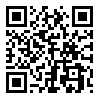مجله رویش روانشناسی از دادن گواهیهای کاغذی معذور است. لطفا تقاضا نکنید. همه گواهی ها در صفحه شخصی کاربران موجود است.
year 13, Issue 2 (spring 2024)
Rooyesh 2024, 13(2): 101-108 |
Back to browse issues page
Download citation:
BibTeX | RIS | EndNote | Medlars | ProCite | Reference Manager | RefWorks
Send citation to:



BibTeX | RIS | EndNote | Medlars | ProCite | Reference Manager | RefWorks
Send citation to:
Daremi S, Mansobi Far M, Havassi Soumar N, Shokrzadeh S, Tarimoradi A. (2024). Predicting mental fatigue based on avoidant attachment style and self-management and dysfunctional performance in couples referring to clinics in Tehran. Rooyesh. 13(2), 101-108.
URL: http://frooyesh.ir/article-1-4947-en.html
URL: http://frooyesh.ir/article-1-4947-en.html
Salemeh Daremi1 
 , Mohsen Mansobi Far *2
, Mohsen Mansobi Far *2 
 , Nahid Havassi Soumar3
, Nahid Havassi Soumar3 
 , Shohreh Shokrzadeh4
, Shohreh Shokrzadeh4 
 , Arezoo Tarimoradi3
, Arezoo Tarimoradi3 


 , Mohsen Mansobi Far *2
, Mohsen Mansobi Far *2 
 , Nahid Havassi Soumar3
, Nahid Havassi Soumar3 
 , Shohreh Shokrzadeh4
, Shohreh Shokrzadeh4 
 , Arezoo Tarimoradi3
, Arezoo Tarimoradi3 

1- PhD Student in Psychology, Department of Psychology, Karaj Branch, Islamic Azad university, Karaj, Iran.
2- Assistant Professor, Department of Psychology, Karaj Branch, Islamic Azad University, Karaj, Iran. ,mohsen.masoobifar@kiau.ac.ir
3- Assistant Professor, Department of Psychology, Karaj Branch, Islamic Azad University, Karaj, Iran.
4- Assistant Professor, Department of Psychology, Tehran Research Science Unit, Islamic Azad University, Tehran, Iran.
2- Assistant Professor, Department of Psychology, Karaj Branch, Islamic Azad University, Karaj, Iran. ,
3- Assistant Professor, Department of Psychology, Karaj Branch, Islamic Azad University, Karaj, Iran.
4- Assistant Professor, Department of Psychology, Tehran Research Science Unit, Islamic Azad University, Tehran, Iran.
Abstract: (1411 Views)
This research aimed to predict mental fatigue based on avoidant attachment style and self-management and dysfunctional functioning in couples referring to clinics in Tehran. The current research is part of applied research in terms of its purpose and terms of descriptive-correlational methods. The statistical population in this research included all couples who were referred to psychological and counseling clinics in the 6th and 7th regions of Tehran in 2021, from which 186 couples were selected by purposive sampling. The tools of this research included Pines Marital Burnout (CBM, 1996), Collins and Reed Attachment Questionnaire (RAAS, 1990), and Young's Primary Maladaptive Schemas Questionnaire (YSQ-SF, 2005). The method of data analysis was simultaneous regression analysis. The findings showed that there is a significant relationship between avoidant attachment style and self-management with mental fatigue (p<0.05). It is concluded that avoidant attachment, self-management, and dysfunctional performance play an essential role in predicting mental fatigue and explain 17.1% of the variance of mental fatigue.
Keywords: Psychological fatigue, impaired self-management and performance, avoidant attachment style.
Type of Article: Research |
Subject:
General Psychology
Received: 2023/11/7 | Accepted: 2023/11/29 | ePublished: 2024/04/29
Received: 2023/11/7 | Accepted: 2023/11/29 | ePublished: 2024/04/29
Send email to the article author
| Rights and permissions | |
 |
This work is licensed under a Creative Commons Attribution-NonCommercial 4.0 International License. |



